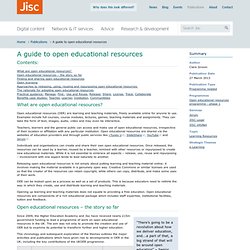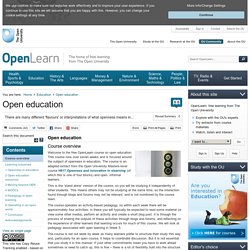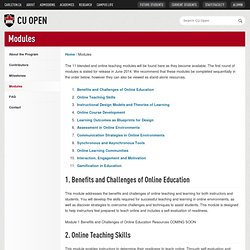

OpenLearn. Download for Free 2.6 Million Images from Books Published Over Last 500 Years on Flickr. Discovering Literature: Romantics and Victorians - The British Library. CU Open - Carleton University. OER 101 Trailer - Fab! A guide to open educational resources. Contents: What are open educational resources?

Open educational resources (OER) are learning and teaching materials, freely available online for anyone to use. Examples include full courses, course modules, lectures, games, teaching materials and assignments. They can take the form of text, images, audio, video and may even be interactive. Teachers, learners and the general public can access and make use of open educational resources, irrespective of their location or affiliation with any particular institution.
Individuals and organisations can create and share their own open educational resources. Releasing open educational resources is not simply about putting learning and teaching material online; it involves making the material available in a genuinely open way. OER can be looked upon as a process as well as a set of products. Opening up learning and teaching materials does not equate to providing a free education. Open educational resources – the story so far. Merlot. Free learning resources for teachers. Free Online Course Materials. CC Search. OER Commons. Open education - Martin Weller Openlearn open course. Welcome to the free OpenLearn course on open education.

This course runs over seven weeks and is focused around the subject of openness in education. The course is an adapted extract from the Open University Masters-level course H817 Openness and innovation in elearning55 [Tip: hold Ctrl and click a link to open it in a new tab. (Hide tip56)] (of which this is one of four blocks) and open, informal learners. This is the ‘stand alone’ version of the course, so you will be studying it independently of other students. This means others may not be studying at the same time, so the interaction found through blogs and forums may not be relevant, and is not monitored by the course team. The course operates an activity-based pedagogy, so within each week there will be approximately four activities: in these you will typically be expected to read some material (or view some other media), perform an activity and create a short blog post. The topics you will study in the coming weeks are: Oxford Department of Education Public Seminars.
Join us in building understanding of open education. Modules - CU Open. The 11 blended and online teaching modules will be found here as they become available.

The first round of modules is slated for release in June 2014. We recommend that these modules be completed sequentially in the order below, however they can also be viewed as stand-alone resources. 1. Benefits and Challenges of Online Education This module addresses the benefits and challenges of online teaching and learning for both instructors and students. Module 1 Benefits and Challenges of Online Education Resources COMING SOON 2. This module enables instructors to determine their readiness to teach online. Module 2 Online Teaching Skills Resources 3. This module introduces the benefits of instructional design methodology used during course development.
Module 3 Instructional Design Models and Theories of Learning Resources 4. This module emphasizes the importance of planning stages in the development of online courses when using a project- and team-based approach. Commons. Lessons Worth Sharing. iPad - iTunes U. TeacherTube. Khan Academy. Online Education: Explore 2014's Best Colleges & Resources.
Librarianchick.